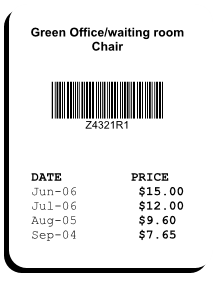Make sure your items sell by offering appropriate discounts
You have some choices for how to discount items at your thrift store!
The price you put on an item might not be its appropriate or fair price. Sometimes an item will need to sell for less than the amount you initially put on the item. You have some options for how to discount!
Manual discounting
This is one of the most basic methods. You walk through your store and put new price tags on items that have been sitting around for a while. It's simple, but it's time-consuming. (Also, if you have a large inventory, it's hard to keep track of what's been around for a long time.
Color-based discounting
This method of discounting is very popular with thrift stores and customers alike.
Customers love this because they can spot a deal from a mile away (all they need to do is look out for a color), and stores love it because it's simple. The downside is that items priced at the end of a month may be discounted just days later.
Some stores, to avoid instantly discounting items may keep an item at full price for the first month and again the second month (e.g., month 1: full price, month 2: full price, month 3: 25% off, month 4: 50% off.)
If you using ThriftCart as your thrift retail POS system, you can set up color-based discounting easily. The discount cycle can be on your schedule (weekly, monthly, bi-weekly, weekly with a special super-clearance day at the end of the week, etc.) Also, some stores do ad-hoc discounting, rotating the colors at unpredictable intervals to keep things exciting for customers.
Price tag with decreasing prices

This option requires you to use ThriftCart as a barcode tagging for your thrift store. Here the price tag display the initial price,
as well as a series of price points for future dates. The upside is that each item is discounted after precisely the same number of days in the store (which is not possible with a color-based discounting system
where items are grouped by the week or the month that they arrived in your store.) The downside is that customers cannot typically spot discounted items from far away. Rather, they have to manually inspect the price
tag and then find the price that is the current price for the item. Also, it has the further downside of alerting the customer to the exact date that the next discount will occur. While many avid thrift shoppers will
be aware of the date that color-discounts typically change, most normal shoppers will not know when a store will next rotate their color discounts. However, if you display the date of the next discount on the price tag,
everyone will know the date they should wait for with buying the item. There are some stores where this pricing scheme makes sense, but for the majority of stores, simple color-based discounting is easier.
Department-wide sales
Rather than discounting items based on age, discount entire departments, whether the items are old or new, for example:
Extra ideas
One promotion I've seen is one a special day of the month, there might be a bag sale. For example, fill a paper grocery bag to the brim with any clothing not tagged with this month's color and get
the entire bag of clothing for $9.99. This is an effective way to clear out large amounts of old inventory.
Another exciting promotion would be to offer items that have not sold for free to customers who are members of your thrift club. Start a club with a membership fee of, say, $10/month. Club members
get the color discounts one day before everyone else (so if you rotate your discounts on the first day of the month, club members get the new discounts on the last day of the month.) Then, after an item
has reached its final discount level (say 75% off), if it's the final day of the discount, let the club members have those items for free (or maybe 95% off). Make it enough to finally clear the items out
of the store. How fresh your inventory is greatly affects how most customers view your stores. So, it could be productive to have your most loyal customers help you cycle out the inventory that's languishing.
Whatever discount system works for your store, ThriftCart supports it! ThriftCart is thrift store software, so we know how your thrift and reuse stores work! For example, if you do color-based discounting,
ThriftCart can force the cashiers to pick the color as the first step of ringing up the item, so they never forget a discount that the customer is entitled to. (So that means you won't have to do a refund
when the customer realizes that they were charged wrong!) We'd love to give you a free demo of ThriftCart's point of sale system so you can see what it can do for you.
